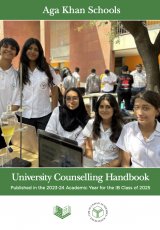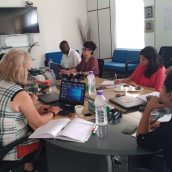The Teacher Preparation Programme – Cultivating IB Leader-Educators
When Timoteo Ombati, an outstanding graduate from Kenyatta University in Kenya, was inducted into the Aga Khan Academy Mombasa’s Teacher Preparation Programme (TPP) in 2016, he was elated.
“I couldn't hide my joy,” he says exuberantly. “I celebrated with the whole village!”
Highly energetic and ambitious, Timoteo says it was his training with the TPP that drove him to acquire fresh perspectives on teaching and redefine his credo on instruction.
The TPP, a multi-phase programme, was designed by the Aga Khan Academies to train outstanding graduates from public universities to teach one or more of the International Baccalaureate (IB) programmes at the Academies. The initial component of the three-part programme, the Choosing to Teach Institute, was launched in Mombasa in 2013. This was followed by the other two components: the Learning to Teach Internship and the Teaching to Learn Residency. Today, the programme is offered at all Academies.
Training transformative educators
The aim of the TPP is to train teachers to become transformative educators in their communities with the vision, as the programme guide states, “to provide exceptionally talented and highly motivated Academies students with a rigorous academic and leadership-development experience.” The skills the trainees gain from completing any component of the programme are considered highly valuable in any teaching setting, thus creating the potential to raise academic standards in the variety of schools in which they might teach.
This capacity-building endeavour to improve the quality of education in local schools is clearly stated in the TPP mission statement which reads: “The TPP seeks to develop teachers who are talented individuals with high professional expectations and aspirations; are creative and committed to their own lifelong learning and self-improvement; and have a strong professional identity grounded in a well-articulated philosophy of teaching.”
The TPP’s curriculum makes a fundamental shift – from a focus on teaching to a focus on learning. It is designed to help teachers internalise the IB education philosophy. “The TPP story is rich,” states curriculum coordinator, Tom Abuto, radiating pride and ambition for his students. He is quick to emphasise that only the topmost candidates are recruited into the rigorous and competitive full 18-month programme.
Perspectives from TPP teachers
“That today I can teach concepts through real-life settings is a testament to the TPP’s effectiveness,” says Timoteo, who, as an intern, was teaching French. He is referring to one of the programme’s fundamental inquiry-driven approaches to teaching, called problem-based learning. In this dynamic approach, students engage in exploring real-world problems and challenges.
Kepha Obiri Mogere, a 2014 education graduate from the University of Nairobi in Kenya was admitted into the programme in Mombasa in 2015. He is now the Academy in Mombasa's Junior School vice principal and Primary Years Programme (PYP) coordinator. It was his insatiable urge to learn new things and innovative ideas that drove him to complete the rigorous training.
Since completing the TPP, Kepha reports that he has made remarkable progress toward discovering who he really is through self-awareness and self-reflection. “I am a very different teacher from the one that graduated from university in 2014,” he says with conviction. “It is through the TPP that I gained knowledge, among other things, of the concept of differentiation in the classroom. Through this concept, I have learnt to tailor my instruction to meet the individual needs of each student in the classroom.”
Another candidate who credits the TPP for equipping her with the knowledge and skills necessary to successfully teach the IB programme is Cynthia Okoth, an education graduate from the University of Nairobi. Cynthia graduated in 2014 and completed her TPP training in Mombasa in 2016.
“My teaching methods have become dynamic,” Cynthia says. “The TPP forced me to cultivate deep thinking skills and deep analytical skills.”
TPP across the Academies network
At the Aga Khan Academy Hyderabad, Afeera Maryam, one of the TPP graduates, reminisces about her experience during the programme. specifically the Choosing to Teach Institute, the initial phase of the TPP.
“Day one [of the TPP Institute] was great – we dedicated it solely to exploring the philosophies of education,” Afeera said, who had been teaching for four years already but was new to the IB programme. “Subsequent discussions were rigorous and challenged us to think more about education. Overall, the programme focused on making us better teachers by provoking us to reflect, collaborate and question ourselves each day. Himani Sood, another intern in Hyderabad, says the TPP provided her an opportunity for “immense self-growth.”
Afeera is now the head of the Middle Years Programme for Grades 6-8 and a humanities teacher at the Academy in Hyderabad. She has also collaborated with other humanities teachers across the Academies to develop a humanities curriculum for the IB, which is being used across the Academies.
At the Aga Khan Academy Maputo and the Aga Khan Academy Dhaka, TPP interns have worked closely with experienced teachers from the Academies in Mombasa and Hyderabad, respectively. Sumeya Nemane Ussene Taquidir, one of the interns from the Academy in Maputo, speaks hearteningly of her recognition of the effectiveness of the new teaching approaches. “The TPP has completely transformed my teaching method. Today I look at myself as a guide or a facilitator to the student. Now I can see that the students are the centre of learning and they already have some knowledge and we just need to guide them to build that knowledge.”
Pinto Belo Joao, also a TPP intern in Maputo expresses similar sentiments on how the programme has transformed his teaching style. “My teaching strategies have improved because of the TPP. Now I know that students have to take responsibility for their own learning. The teacher’s role is to facilitate this process.”
External recognition
The TPP is offered in partnership with the University of British Columbia which provides some input into programme quality assurance and external assessment of participants’ work. It is also the first school-based programme to be recognised by the IB Educator Certificate in Teaching and Learning and the only such programme on the African continent. The programme also certifies graduates of the TPP Institute with a professional development qualification, which is accredited by Cambridge International, a part of Cambridge University
The TPP educators believe that the programme’s distinctive curriculum has the power to train teacher-leaders to motivate students to become agents of social change in their communities. The programme endeavours to produce teachers who are reflective, purposeful and motivated to pursue knowledge on an ongoing basis for personal and professional development.
Timoteo feels the skills he has acquired while training with the TPP have enriched him for life. They have completely altered his old beliefs and his old thinking. “My teaching methods have radically changed. A teacher who was very sceptical of the TPP’s cooperative learning strategies is now its staunchest defender. My classroom has now become a collaborative learning space,” he muses deferentially.
“We can’t have great student leaders without having great teacher leaders,” says the Director of Academies, Salim Bhatia. A crucial aspect of the vision and mission of the Academies is to develop homegrown leaders, and valuable partnerships with credible institutions like the International Baccalaureate and the University of British Columbia act as a catalyst to achieving that goal.
By Perviz Walji
publications








